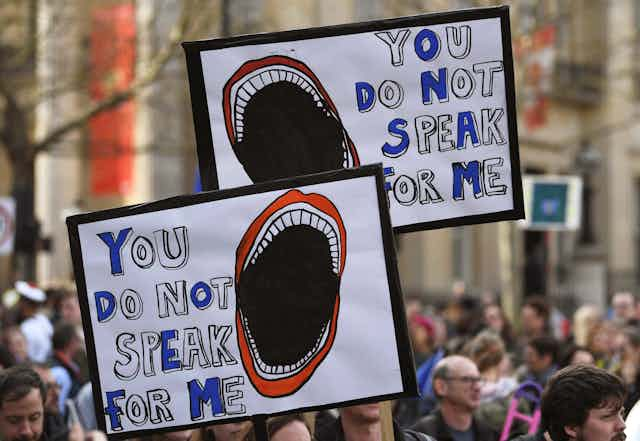The term “moderate” is thrown around an awful lot. We’re given to understand that Pete Buttigieg, Beto O’Rourke and Amy Klobuchar are moderates currently running for the US presidency. As I show in my book March of the Moderates, Tony Blair, Gerhard Schroeder, and Bill Clinton were leading moderates in the ascendancy two decades ago. Meanwhile, many commentators would assert that Donald Trump and Jeremy Corbyn definitely aren’t moderate.
Given how often we use term “moderate”, it deserves a bit of unpacking. We can all assert moderate or extreme positions on various issues. We all have different views on tax and spending, for example, and these often vary according to national contexts. Like the terms “progressive” or “liberal”, the concept of being moderate is pretty malleable.
Yet I’d argue there are four key criteria to moderate politics. These might be imperfect, but they do at least capture a sense of the matter.
Are the party and the people on the same page?
The first move must be to “moderate” between your party and the electorate.
Let’s face it, joining a political party is a pretty weird endeavour. About one million British citizens are members of political parties – around 2% of the adult population. That’s about the same number of Britons who currently watch the Australian soap Neighbours. In both cases, these are figures well down on their heyday.
This is a problem – because the types of people who are political tend to be very political.

To secure a party’s nomination, candidates often must gain the backing of a trade union or business association. This might require flirting with an extreme position or two - often rampant nationalisation for candidates of the Labour left, or uncosted tax cuts for the Conservative right - as seen recently with Boris Johnson. But then, in order to win an election among the wider public, they may well need to stand up to union brinkmanship, or take on corporate vested interests.
This switch is not easy, but it is necessary. Otherwise we end up with politicians ranting to the converted. A recent case of particular importance is Johnson’s presentation of a no-deal Brexit as the will of the British people (the majority of whom are known to oppose it) rather than the will of his party (the majority of whom support it). Some sense of what is moderate outside your own echo chamber is vital.
What are rivals doing?
The second moderating factor is between one’s party and the other side. Basically, the other team will occasionally have a point. Accepting this is good tactics and good policy. Blair did not undo the broad architecture of Margaret Thatcher’s trade union reforms, for example. Clinton understood that voters had quite liked Ronald Reagan’s tough talking defence policy. And David Cameron rightly bought some of the socially liberal ends of New Labour. Crucially, the people agreed, and these figures all won elections.
This doesn’t mean abandoning your big goals. A national minimum wage and public service investment for New Labour, hiking tax credits for the New Democrats, or reducing the deficit for the Cameron coalition. All these things still happened. But a little light and shade doesn’t hurt, particularly in an age of hung parliaments, or adversarial relationships between the White House and Congress.
What’s coming out of their mouth?
Thirdly, moderate candidates talk moderately. They accept that there are limitations to what can and should be said. This is not pussyfooting around or being overly politically correct. If you dehumanise sections of the electorate you not only cut them off for voting for you, but in believing in the democratic process at all – and that has consequences.
Moderates accept that politics is about compromise, and maybe that is not such a bad thing. Calling Hillary Clinton “crooked” or Biden “sleepy” might win you an election, but it harms the health of the broader polity.
Are they selling change too hard?
Finally, moderate politicians moderate between the past and the future. In 1992, US media strategist James Carville pitched Bill Clinton as the candidate of “change versus more of the same”. In 1997, New Labour declared that “Things Can Only Get Better”. These were both accurate, and summed up the achievements both would indeed deliver. Projecting such ambitious visions for the future certainly is important.

But such figures also recognise that the electorate is often fundamentally conservative in many ways. They look backwards, and view change cautiously – in some areas even suspiciously. If you throw a George McGovern or Michael Foot-style kitchen sink at voters, or indeed a Corbyn-sized one, a significant caucus will rise against you.
This is particularly true for the left. Put an immoderate left-wing candidate against an immoderate right-wing one, and the right nearly always wins. Think Reagan vs Walter Mondale and, in some ways, George Bush vs Michael Dukakis, too. The genius of Blair and Clinton was to recognise that politics, particularly from opposition, is generally conducted on a conservative playing field. Big change has to be sold cautiously, and with trade offs elsewhere.
I’m not pretending that these rules are without problems. Nor that they capture every conceivable “moderate” candidate. But in an age where a lot of mud is thrown it is best to be as precise as possible. With Americans more likely to describe themselves as “moderate” than “liberal” in 49 of the 50 states (Maine is the exception), such politics forms the best Democratic route back to the White House. Like alcohol or food consumption, everything may be best in moderation.

